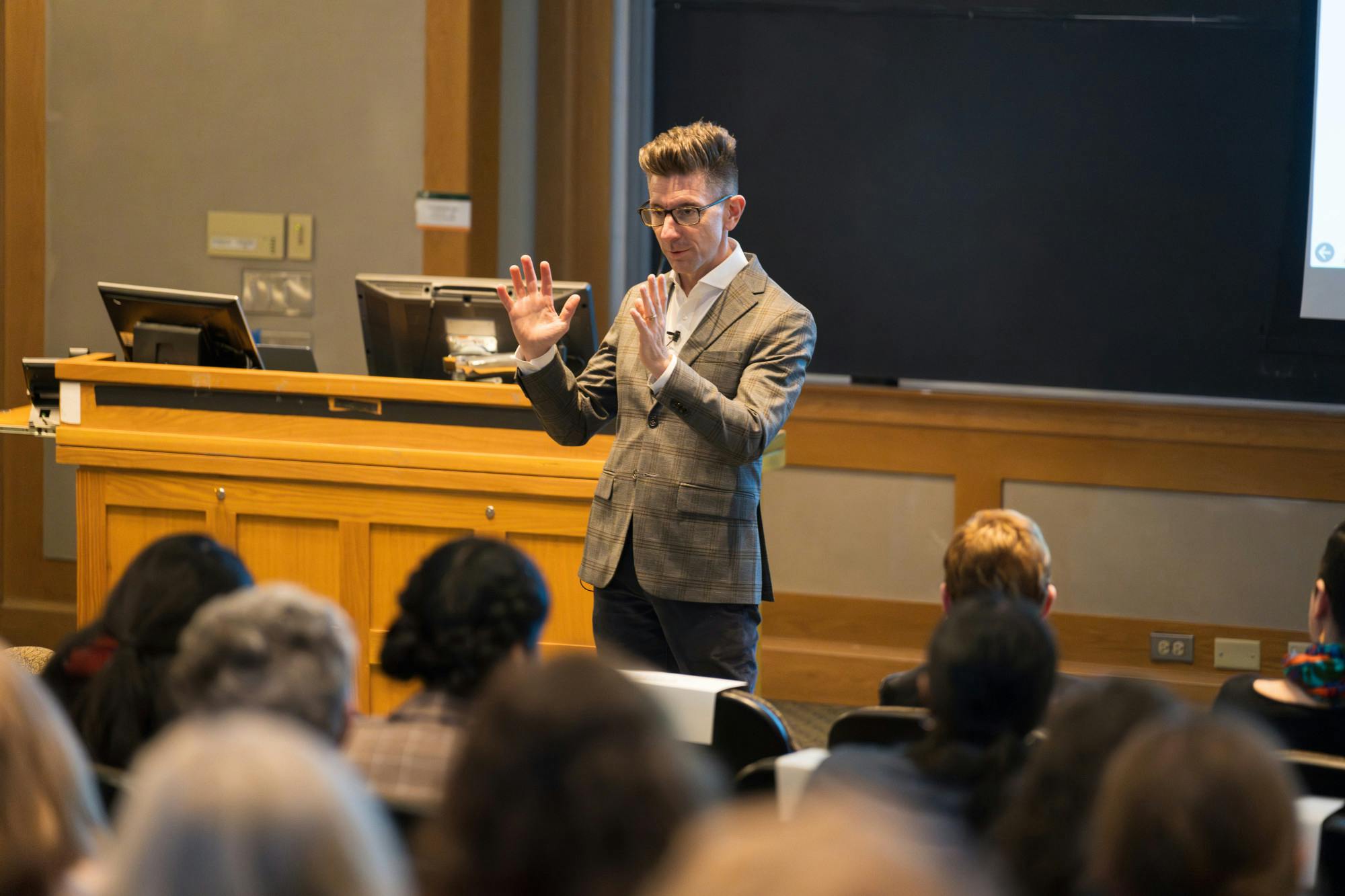On Jan. 26, the Dartmouth Dialogue Project held the first talk in its Executive Speaker series in Filene Auditorium. Over 100 students, faculty and Upper Valley residents attended the talk, entitled “Emotional Intelligence: Pathway to Well-Being, Productive Relationships and Professional Success,” which was delivered by Marc Brackett, the founding director of the Yale University Center for Emotional Intelligence.
Dialogue Project co-director Elizabeth Smith said in an interview after the event that she has wanted to invite Brackett to campus since she read his book — “Permission to Feel: The Power of Emotional Intelligence to Achieve Well-Being and Success” — two years ago.
“Dialogue skills are important and learnable,” Smith said. “They’re not something you’re born with or not born with. It’s a life journey, where you’ll constantly be learning and acquiring emotional skills. And the data shows that the investment is worth it.”
Before the speech began, Brackett sent out a survey to the audience members about emotional intelligence. According to the survey, around 60% of the 75 respondents believed that they had learned “next to nothing” or “very little” about emotions in school.
“We’re emotionally illiterate,” he said.
Brackett also listed the five reasons we ought to value emotional intelligence: attention and memory, decision-making, relationship quality, physical and mental health and performance.
He then stressed that emotions should be approached with curiosity rather than judgment. He introduced his RULER model for emotions — Recognizing, Understanding, Labeling, Expressing and Regulating.
Brackett said that people rarely take the time to notice and engage with their emotions. He invited the audience to reflect on their current emotional state.
“Raise your hand if you’ve woken up wondering, ‘What am I doing with my life? Do I want to approach this day, or just pull the covers over my head?’” Brackett asked.
Brackett noted that people also interpret facial expressions in different ways and asked four audience members to describe a facial expression that he made. All four audience members identified different emotions.
Brackett then shared the results of a study indicating that greater emotional intelligence is correlated with improved relationships, fulfillment at work and even better sleep. He recounted an anecdote about how the lessons his own feelings coach taught him continue to impact him 45 years later.
Brackett ended his speech by sharing practical tips on how to practice emotional intelligence in real life. He said it is important for people to give themselves permission to feel, to take detailed notes on how and when they experience certain feelings and to establish strategies ahead of time to address these feelings.
“Emotional intelligence is not a magic pill, but maybe it’s a good place to start,” Brackett said.
Melanie Guillen ’24 said she appreciated Brackett’s focus on the science behind emotional intelligence.
“My biggest takeaway was how backed by research it is to be in tune with your emotions,” Guillen said. “I liked how it was a call to action to not just be in tune with yourself, but to be the person … to make others feel understood and heard.”
Guillen added that dialogue is important in light of Dartmouth’s “high-pressure” culture.
“You have high expectations for yourself, and others have high expectations for you,” Guillen said. “Having the space to explore, fail and be vulnerable would really change the career paths people would take, or the relationships they would build.”
Jessica Chiriboga ’24 said she was “excited” to have Brackett visit campus because she believed that emotional intelligence is “such an under-appreciated component of leadership development, but also just being a human.”
“I took a lot away from his speech, with the strategies and recommendations [Brackett] made to recognize our own emotions and label them, and the importance of finding people in our life who can discuss our emotions with us and help us on our journeys,” Chiriboga said.
Chiriboga added that she has high hopes for the impact the Dartmouth Dialogue Project could have on students.
“I know a lot of people who have trouble sharing what they really feel,” Chiriboga said. “So, I hope that conversations like this can help us figure out how we can be more open and have this grace and understanding for other people, wherever they might be.”
Guillen noted that she felt the people who attended the event were “a very self-selected group who want to be emotionally in-tune and feel like [emotional intelligence] is important.”
“For the rest of campus, will this really stick?” Guillen asked. “You have to convince people to even want to learn it or try it … It will be interesting to see if this will have the intended effect.”




